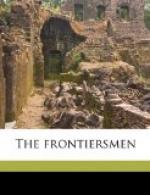Apart from this reflection, it was natural that his eyes should follow the contestant whom he had backed for a winner to the tune of more silver bangles, and “ear-bobs,” and strings of “roanoke,” and gunpowder, and red and white paint, than he was minded to lightly lose. He had laid his wagers with a keen calculation of the relative endowments of the players, their dexterity, their experience, their endurance. He was not influenced by any pride of race in the fact that his champion was also a white man, who, indeed, carried a good share of the favor of the spectators.
A strange object was this champion, at once pathetic and splendid. No muscular development could have been finer, no athletic grace more pronounced than his physique displayed. The wild life and training of the woods and the savage wars had brought out all the constitutional endurance and strength inherited from his stanch English father and his hardy Scotch mother. Both had been murdered by the Cherokees in a frontier massacre, and as a boy of ten years of age, his life spared in some freak of the moment, he had been conveyed hither, exhorted to forget, adopted into the tribe, brought up with their peculiar kindness in the rearing of children, taught all the sylvan arts, and trained to the stern duties of war by the noted chief Colannah Gigagei, himself, the Great Red Raven of Tennessee Town (sometimes called Quorinnah, the name being a favorite war-title specially coveted). The youth had had his baptism of fire in the ceaseless




